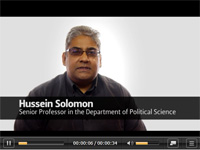Latest News Archive
Please select Category, Year, and then Month to display items
09 December 2020
|
Story UFS entral academic advising team
|
Photo Pixabay

It wasn’t easy, but we all got to this point because we stayed calm and made the effort to learn on even when it was difficult.
The University of the Free State (UFS) has remained committed to supporting you in every way possible, and as you prepare for the final assessments, remember to access the support tools you will need in order to successfully complete the 2020 academic year: https://www.ufs.ac.za/toolsforsuccess
Main exams are running from 30 November to 19 December 2020
All of the best, and break a pen in your upcoming final assessments. For those of you who will be graduating, we cannot wait to see you in that graduation attire; and those who still have some way to go, we cannot wait to serve you again in 2021 as we continue the pursuit of academic success!
Below are five main study tips that you can use for final assessment success:
1. Set a realistic study schedule
You might think that studying for eight hours straight for four days before the exam, will help you get through the work in time. See final edition of the #UFSLearnOn for more information.
2. Structure and organise your work
If your notes are organised, it is also easier for your brain to recall information, even when you become nervous during exams.
3. Practise with an old exam/semester test paper
Practice makes perfect, and although the final assessments might look different in how they are administered, it will still help to practise using old tests and exams.
4. Adapt your strategies to the content
What works for one module or even one learning outcome, might not be effective for another. You need to continually adapt your note-taking and study approaches. See #UFSLearnOn final edition for different study methods.
5. Healthy body, healthy mind
Your brain needs optimal care to perform at its best, and getting physically active (even if it is by jumping in one spot if space is limited) forces your body to release neurotransmitters responsible for positive emotions, which assist in retaining information in your memory …
Download the final edition of #UFSLearnOn that points you towards the resources you’ll need to ace your final assessments and end 2020 off on a high note!
Islam. Boko Haram. Terrorism. Prof Hussein Solomon offers insight.
2014-09-04
 Photo: en.wikipedia.org |
Prof Hussein Solomon introduction: video

When it comes to politics, there are lots of negative talk, but without any action or solutions.
However, with Prof Hussein Solomon, Senior Professor at the UFS’s Department of Political Science, there is not a lot of talk without solutions, but great activity regarding research work published on Islam, the Middle East, Boko Haram and environmental issues in Africa.
Prof Solomon’s most recently published article, Five Lessons Learned from Ejecting Islamists in Mali, was published in the Research on Islam and Muslims in Africa (RIMA) Policy Papers on 1 September 2014.
(https://muslimsinafrica.wordpress.com/2014/09/01/five-lessons-learned-from-ejecting-islamists-in-mali-professor-hussein-solomon/ ).
“The terrorist threat is mounting with each passing day in Africa with Islamist terror groups exploiting the ungoverned spaces, the availability of weapons, porous borders, an incompetent security apparatus and corruption in the political establishment,” Prof Solomon writes in this paper.
“It is therefore important, to explore cases where attempts have been made to dislodge the Islamists with a view to learn lessons so that future interventions do not repeat the failures of the past. This paper explores the intervention and lessons which could be learned from French and Economic Community of West African States (ECOWAS) attempts to oust Islamists in northern Mali in 2013.”
Prof Solomon holds a DLitt et Phil (Political Science) from the University of South Africa (UNISA). In 2011, he was Visiting Professor at the Osaka School for International Public Policy (OSIPP). In 2007 and 2010 he was Visiting Professor at the Global Collaboration Centre at Osaka University in Japan and in 2008 he was Nelson Mandela Chair of African Studies at Jawahrlal Nehru University in New Delhi, India. In 1994, he was Senior Visiting Fellow at the Department of War Studies, King’s College at the University of London. He is currently a Visiting Fellow at the MacKinder Programme for the Study of Long-Wave Events at the London School of Economics and Political Science in the United Kingdom.
He is also a Senior Associate for the Israeli-based think tank Research on Islam and Muslim in Africa and a Senior Analyst for WikiStrat.
More articles by Prof Solomon:
Boko Haram and the case of the abducted school girls
http://muslimsinafrica.wordpress.com/2014/05/14/reinvigorating-the-fight-against-boko-haram-professor-hussein-solomon/
Australian Broadcasting Corporation interview on Boko Haram
http://www.abc.net.au/radionational/programs/counterpoint/boko-haram/5657882
Reflections on Inga 3 and Beyond
www.saccps.blogspot.com
Nile and Okavanga River Basins (pdf)
Nigeria’s Boko Haram: Beyond the rhetoric (pdf)